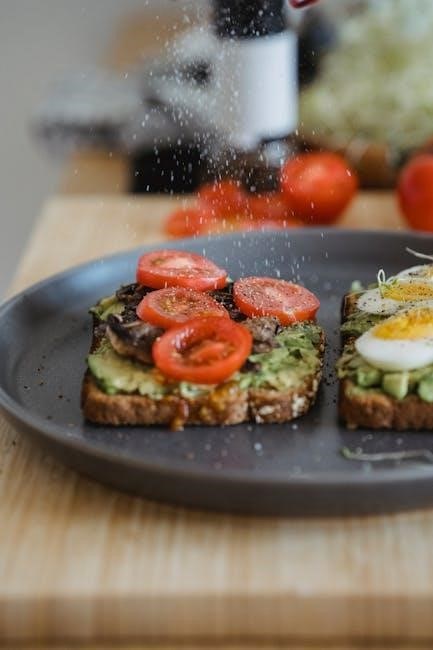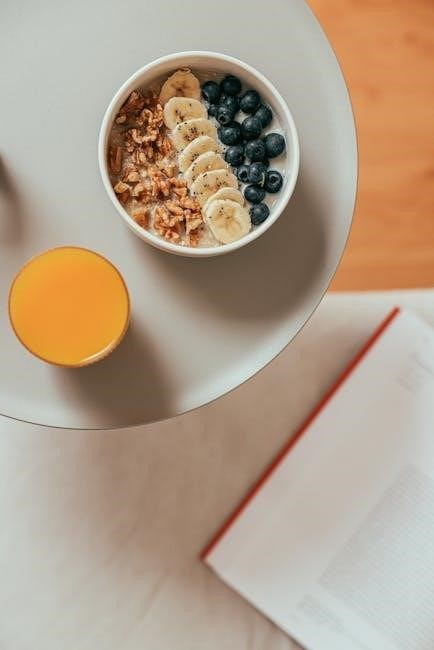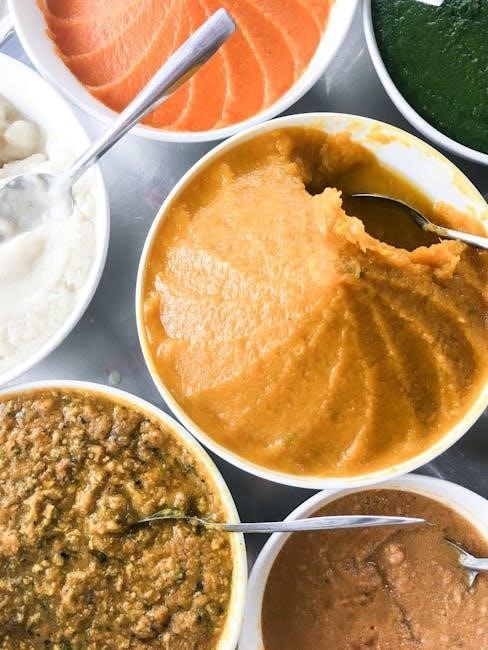
Vegetarian bodybuilding combines plant-based nutrition with resistance training to build muscle. It emphasizes protein-rich foods, balanced macronutrients, and proper meal planning to support muscle growth and overall health.
1.1 Understanding the Core Principles of Vegetarian Bodybuilding
Vegetarian bodybuilding revolves around plant-based nutrition, emphasizing protein-rich foods, balanced macronutrients, and strategic meal planning. It prioritizes whole, nutrient-dense foods, proper caloric intake, and hydration. The key is to optimize muscle growth and recovery through a well-structured diet, avoiding animal-derived products while ensuring adequate protein and essential nutrients for performance and health.
1.2 Benefits of a Plant-Based Diet for Muscle Growth
A plant-based diet offers numerous benefits for muscle growth, including high protein options, anti-inflammatory properties, and rich nutrient density. It supports lean muscle development, enhances recovery, and reduces overall inflammation, promoting better performance and longevity in bodybuilding while adhering to ethical and sustainable lifestyle choices.
Protein Sources for Vegetarian Bodybuilders
Vegetarian bodybuilders can thrive on legumes, tofu, tempeh, quinoa, lentils, beans, seitan, and edamame, all providing essential protein for muscle repair and growth.
2.1 High-Protein Plant-Based Foods (Legumes, Tofu, Tempeh)
Legumes, tofu, and tempeh are excellent high-protein plant-based foods. Lentils, chickpeas, black beans, and edamame are rich in protein and fiber. Tofu and tempeh, derived from soybeans, offer complete amino acid profiles, making them ideal for muscle repair. Incorporating these foods into meals ensures adequate protein intake, supporting muscle growth and recovery for vegetarian bodybuilders.
2.2 Role of Supplements (Plant-Based Protein Powders)
Plant-based protein powders are vital for meeting protein needs, especially when whole food intake is insufficient. Pea, hemp, and brown rice proteins are popular, hypoallergenic options. They provide essential amino acids, supporting muscle recovery and growth. Supplements are convenient for post-workout recovery and can help achieve daily protein goals, ensuring vegetarian bodybuilders maintain optimal nutrition for muscle development and performance.
Caloric Intake and Macronutrient Balance
Caloric intake and macronutrient balance are crucial for muscle growth. A surplus of calories, paired with balanced carbs, proteins, and fats, fuels muscle development and recovery effectively.
3.1 Importance of Caloric Surplus for Muscle Gain
A caloric surplus is essential for muscle gain as it provides the energy needed for muscle repair and growth. Vegetarian bodybuilders must consume more calories than they burn, ensuring adequate protein, carbohydrates, and fats to support muscle synthesis and recovery. A well-planned surplus helps achieve muscle-building goals without excessive fat gain, making it a cornerstone of effective bodybuilding nutrition.
3.2 Balancing Carbohydrates, Fats, and Proteins
Balancing carbohydrates, fats, and proteins is crucial for vegetarian bodybuilders. Carbohydrates provide energy for workouts, while proteins aid muscle repair and growth. Healthy fats support hormone production and overall health. A balanced ratio ensures sustained energy, muscle recovery, and optimal performance, making it a key component of an effective vegetarian bodybuilding meal plan.

Meal Frequency and Timing
Meal frequency and timing are essential for vegetarian bodybuilders. Eating 5-6 meals daily, including pre- and post-workout nutrition, supports muscle growth and recovery.
4.1 Optimal Number of Meals for Muscle Recovery
Consuming 5-6 smaller meals throughout the day is ideal for vegetarian bodybuilders. This approach ensures a steady supply of nutrients, supports muscle recovery, and prevents excessive muscle breakdown. Spacing meals evenly helps maintain energy levels and promotes a positive nitrogen balance, which is crucial for muscle growth and repair after intense workouts.
4.2 Pre- and Post-Workout Nutrition Strategies
Pre-workout meals should include complex carbs and healthy fats for sustained energy, such as bananas or oatmeal with nut butter. Post-workout, focus on protein-rich foods like plant-based protein powders, quinoa, or sweet potatoes to aid muscle recovery. Timing meals within 30-60 minutes post-workout optimizes nutrient absorption and replenishes glycogen stores, supporting muscle growth and reducing soreness.

Sample Vegetarian Bodybuilding Meal Plan
A typical day includes breakfast options like oatmeal or tofu scramble, lunches with quinoa bowls or lentil curries, and dinners featuring stir-fries or chickpea dishes, ensuring balanced nutrition.
5.1 Breakfast Options (Oatmeal, Smoothies, Tofu Scramble)
Start with oatmeal topped with nuts and seeds for a protein-rich breakfast. Smoothies blend plant-based protein powder, spinach, banana, and almond milk. Tofu scramble with turmeric and veggies offers a cruelty-free, muscle-building alternative to eggs, paired with whole-grain toast for sustained energy and recovery.
5.2 Lunch and Dinner Ideas (Quinoa Bowls, Lentil Curries)
Quinoa bowls with roasted vegetables, chickpeas, and tahini dressing provide a balanced mix of protein and fiber. Lentil curries with brown rice or whole-grain naan are rich in iron and plant-based protein. Adding spinach, broccoli, and avocado enhances nutrient density and supports muscle recovery. These meals are flavorful, nutritious, and tailored for muscle growth and energy.
5.3 Snacks and Supplements for Muscle Recovery
Nuts, seeds, and nut butters are excellent snack options for quick energy and healthy fats. Plant-based protein powders, such as pea or hemp, support muscle recovery post-workout. Supplements like creatine and BCAAs can enhance performance and reduce muscle soreness. Incorporating hemp seeds and flaxseeds provides essential omega-3s and additional protein, aiding in muscle repair and growth throughout the day.

Meal Prepping Tips for Consistency
Plan meals weekly, batch-cook proteins, and store pre-portioned meals. Organize ingredients and use containers for convenience, ensuring consistency in nutrition and time management.
6.1 Planning and Batch Cooking Strategies
Plan meals weekly, focusing on protein-rich staples like legumes and tofu. Batch-cook grains, proteins, and vegetables to streamline meal prep. Organize ingredients in labeled containers for easy access. Use a calendar to schedule cooking sessions, ensuring meals align with training days. This approach saves time and maintains consistency in nutrition.
6.2 Storing and Organizing Meals for Convenience
Store meals in airtight, labeled containers to maintain freshness and reduce waste. Use stackable containers for easy access and organization. Freeze prepped meals like lentil curries or quinoa bowls for up to 5 days. Keep snacks like nuts or protein bars in designated areas for quick grabs. This system ensures meals are ready-to-eat and fits seamlessly into a busy schedule.

Tracking Progress and Adjustments
Track muscle growth, strength, and recovery weekly. Adjust meal portions, protein intake, or calorie consumption based on progress to optimize results and maintain consistency.
7.1 Monitoring Muscle Growth and Recovery
Regularly monitor muscle growth through measurements and strength gains. Track recovery by observing rest days, sleep quality, and soreness levels. Adjust your meal plan to ensure adequate protein, carbohydrates, and fats, optimizing performance and muscle repair. Fine-tune caloric intake based on progress to achieve desired muscle growth and recovery efficiently without plateauing or overtraining.
7.2 Fine-Tuning the Meal Plan Based on Results
Analyze progress monthly, adjusting macronutrient ratios, portion sizes, and meal frequency as needed. Increase protein intake for muscle gain or reduce carbohydrates for fat loss. Incorporate new recipes to maintain variety and ensure nutritional balance. Regularly review food diaries and training logs to identify areas for improvement and optimize the meal plan for better results and sustainability long-term.

Common Mistakes to Avoid
Overlooking essential nutrients like iron, calcium, and vitamin B12 is common. Ensure consistent meal frequency and portion sizes to avoid stalls in muscle growth and recovery.
8.1 Overlooking Essential Nutrients
Vegetarian bodybuilders often neglect key nutrients like iron, zinc, and vitamin B12, crucial for muscle function and recovery. Iron deficiency can impair oxygen delivery to muscles, while low zinc levels may hinder protein synthesis. Vitamin B12, found primarily in animal products, supports nerve function and energy production. Regularly consuming fortified foods or supplements is essential to avoid these deficiencies and maintain optimal performance.
8.2 Inconsistent Meal Frequency and Portion Sizes
Inconsistent meal timing and portion sizes can hinder muscle growth and recovery. Irregular eating patterns may lead to inadequate nutrient intake, while oversized portions can cause excessive calorie consumption. Maintaining a structured meal schedule with balanced portion sizes ensures steady energy supply and optimal nutrient absorption, crucial for muscle development and overall performance in vegetarian bodybuilding routines.
Vegetarian bodybuilding is achievable with dedication and proper planning. Stay consistent, track progress, and celebrate small victories. Meal prepping and community support can enhance your journey.
9.1 Staying Motivated on a Vegetarian Bodybuilding Journey
Staying motivated requires dedication, clear goals, and celebration of small victories. Surround yourself with like-minded individuals, track progress, and remind yourself of the benefits of a plant-based lifestyle. Meal prepping and consistent nutrition will fuel your workouts and keep you energized. Embrace the journey, stay disciplined, and enjoy the transformative results of vegetarian bodybuilding.
9.2 Resources for Further Guidance
Explore reputable websites, blogs, and books for detailed meal plans and training tips. Join online communities and forums for support and inspiration. Consider consulting a registered dietitian or fitness coach specializing in plant-based diets. Utilize fitness apps for tracking progress and discovering new recipes tailored to your vegetarian bodybuilding goals.
Leave a Reply
You must be logged in to post a comment.